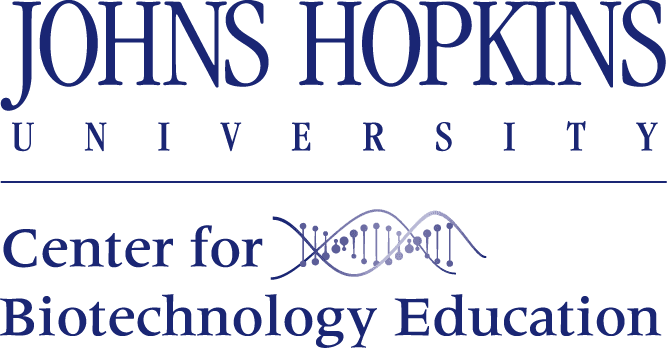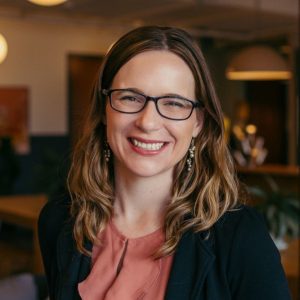In Conversation with Kris Obom, Director for the Center for Biotechnology Education
With the continuing growth of biotech industries in the BioHealth Capital Region, it’s crucial that professionals stay on top of their game in knowing current techniques, trends, and regulations. As such, it’s vital that science education programs are able to meet industry needs and demands when designing their curricula. Numerous colleges and universities in the DMV have risen in response to this call to action to develop hands-on courses and degree programs that not only prepare individuals for present jobs, but also for the jobs of tomorrow.
Johns Hopkins University Montgomery County Campus (JHU MCC) created the Center for Biotechnology Education to fulfill this demand for targeted biotech career training. Dr. Kris Obom, who currently serves as Director for the Center for Biotechnology Education, has been with the Center since its early roots and has played a vital role in its growth and development. I had the pleasure of speaking with Dr. Obom about her time at the Center, how the Center has grown since she started, and where she sees the Center moving forward.

“I’ve been with the Center for Biotechnology Education for about 16 years now. I started at JHU MCC right around the time of the bioinformatics boom, and since then I’ve watched it grow from offering just one advanced degree to six! These degrees include a Masters in Bioinformatics, Individualized Genomics and Health, and Regulatory Sciences, among others. In addition, we’ve expanded to offer three certification programs for professionals who want additional training but do not wish to commit to a full Master’s degree.”
She added, “We really strive to do our homework when we’re designing these new courses and degree programs. We personally reach out to biotech industry professionals to get a sense of what the current hot topics and demands are. More importantly, what type of skills do they want to see in their future employees? Since biotech is such a fast-growing field, it’s important to us that we keep up with current trends so that we’re not only preparing our students for the jobs of today, but also for the jobs of tomorrow.”
After talking to Dr. Obom in more depth regarding the classes and technologies offered through the Center for Biotechnology Education, it’s clear that going that extra mile has paid off! “Over the years we’ve received a lot of support from local companies and the biotech community. With this support we’re very fortunate to be able to offer our students the ability to get hands-on training with equipment that is commonly used in the biotech industry, such as high-throughput screening technologies and bioreactors,” she said. “More importantly, we’ve been able to recruit many outstanding adjunct faculty members who are actually practicing within the biotech field. These faculty serve as a powerful resource to our students because they are learning about biotech first-hand from the experts!”
“It’s also a two-way street for us, because as faculty we also are constantly learning from our students. What makes our program particularly unique is that on top of exposing students to innovative technologies and information, the diversity in career level and background makes for an extremely enriching experience. Not only do we have students who are straight out of college, but we also have students who have already obtained their PhD. We have lawyers, pre-med students, and everything in between. And because of our small classroom size, we all get an opportunity to learn from each other’s perspectives and life experiences. For me, that’s something that’s extremely special. For our adjunct faculty, they’re able to take those experiences back to their workplaces and become better educators and leaders.”

As Dr. Obom reflected on how the Center has grown in the past decade, she also noted how the Center has expanded it’s global reputation and outreach in addition to its curricula. “In recent years we’ve made a large effort to offer many of our classes online so that our content is more accessible to professionals with busy schedules or who have too far of a commute to campus.” When asked about how offering online courses has impacted the program, she noted, “It’s been incredibly positive. Not only have we been able to reach out to students who live in places like Columbia or Baltimore, but we’ve be able to train students from across the nation and throughout the world!” She remarked that through these online courses, the Center has been able to teach students from all seven continents.
“Yes, even Antartica!”, exclaimed Dr. Obom proudly. “We did sometimes have issues with Internet connectively there, but we made it work! Our ability to extend our reach globally has added a tremendous value to our program”.
After chatting with Dr. Obom, it’s clear that the Center for Biotechnology Education isn’t your run-of-the-mill educational program! The Center provides numerous resources for students of all different backgrounds and expertise to gain personalized, hands-on technical training, whether you’ve recently obtained your BS, have a PhD, or have been employed with a company for a number of years.
To wrap up our conversation, I asked Dr. Obom what she’s enjoyed most about her role as Director. “It’s really the students! It’s been such a wonderful experience for me to see our students reach their goals and be able to see their futures ahead of them. I’m so proud of what our students are able to accomplish during their time with us and when they start their careers. That’s what really gets me excited to come to work every morning!”
You can learn more about the degrees and programs offered through the Center for Biotechnology Education here: http://advanced.jhu.edu/academics/centers/center-for-biotechnology-education/
- About the Author
- Latest Posts
Sarah Ellinwood is BioBuzz’s Managing Editor. A scientist by training and a science communicator at heart, Sarah specializes in making complex concepts understandable, engaging, and exciting. She received her Ph.D. in molecular and cellular biology with a focus in infectious disease immunology from the University of Maryland and is passionate about all things related to scicomm, peer mentorship, and women in STEM.





